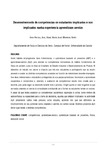Desenvolvemento de competencias en estudantes implicados e non implicados nunha experiencia aprendizaxe-servizo

Ver/
Use este enlace para citar
http://hdl.handle.net/2183/20730
A non ser que se indique outra cousa, a licenza do ítem descríbese como Atribución-NoComercial-CompartirIgual 4.0
Coleccións
Metadatos
Mostrar o rexistro completo do ítemTítulo
Desenvolvemento de competencias en estudantes implicados e non implicados nunha experiencia aprendizaxe-servizoData
2018Resumo
[Resumo] Neste traballo empregáronse dúas metodoloxías; o aprendizaxe baseado en proxectos (ABP) e o aprendizaxe-servizo (ApS) para abordar as competencias transversais da materia Fundamentos de Física de primeiro curso do Grao en Enxeñería de Deseño Industrial e Desenvolvemento do Produto. O obxectivo do traballo era valorar o impacto que tiña nos estudantes a participación nun ou noutro proxecto e avaliar as distintas competencias acadadas en función da metodoloxía docente empregada.Nas dúas metodoloxías o estudante é protagonista da súa propia aprendizaxe, favorecese a aprendizaxe cooperativa e colaborativa e, ademais, a avaliación de competencias resulta máis sinxela para o docente, pois pode seguir ao estudante durante todo o proceso. O ApS aporta un valor engadido xa que se realiza demais un servizo á comunidade contribuíndo así a formar os estudantes tamén en valores.
A pesar de que todos acadaron as competencias académicas esperadas e outras coma mellora da autoconfianza ou capacidade para a toma de decisións, aqueles que estaban implicados na actividade ApS presentaron outras máis persoais coma empatía, aprender dos que son diferentes ou recoñecemento do seu potencial coma cidadáns e axentes do cambio social. Distintos proxectos ApS deron lugar tamén a distintas competencias [Abstract] In this work, two methodologies were used; project-based learning (PBL) and service –learning (S-L) to address the transversal skills of the subject “Fundamentals of Physics”. This subject is taught in the first year of the Degree in Engineering of Industrial Design and Product Development. The objectives of the work were; to assess the impact on the undergraduate students and to evaluate the skills reached, depending on the type of project in which they were involved. In both methodologies, the student is the protagonist of their own learning process, cooperative and collaborative learning are favoured and the skills evaluation is easier for the teacher, who follow the student during the whole process. Besides, S-L brings added value because a service to the community is performed, which helps to educate students also in values. All the students achieved the programmed skills and others, as self-confident or ability to take decisions. But besides, the undergraduate students involved in S-L activity achieved other personal skills, such as empathy, learning from those who are different or recognition of their potential as citizens and agents of social change. Different S-L projects also lead to different skills.
Palabras chave
Competencias
Aprendizaxe-servizo
Aprendizaxe baseada en proxectos
Física
Exclusión social
Skills
Service-learning
Project-based learning
Physics
Social exclusion
Aprendizaxe-servizo
Aprendizaxe baseada en proxectos
Física
Exclusión social
Skills
Service-learning
Project-based learning
Physics
Social exclusion
Dereitos
Atribución-NoComercial-CompartirIgual 4.0






